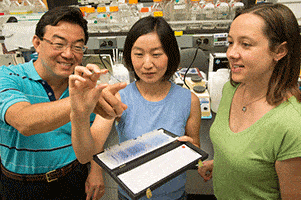calorie restriction
Fountain of youth in bile? Longevity molecule identified
Montreal September 15, 2010 — The human quest for longer life may be one step closer, thanks to research from Concordia University. Published in the journal Aging, a new study is the first to identify the role of a bile acid, called lithocholic ac…
Genetic Regulator Of Lifespan Identified
Researchers at Harvard Medical School (HMS) have discovered that a gene in yeast is a key regulator of lifespan. The gene, PNC1, is the first that has been shown to respond specifically to environmental factors known to affect lifespan in many organisms. A team led by David Sinclair, assistant professor of pathology at HMS, found that PNC1 is required for the lifespan extension that yeast experience under calorie restriction. A yeast strain with five copies of PNC1 lives 70 percent longer than the wild type strain, the longest lifespan extension yet reported in that organism. Their findings are reported in the May 8 Nature.
Calorie restriction reduces age-related brain cell death
Trimming the waistline may not be the only reason to cut calories after the New Year: Doing so also may protect the brain from aging. In the first study to look specifically at the effects of life-long calorie-restricted diets on brain cells, University of Florida researchers determined certain proteins linked to cell death that naturally increase with age were significantly reduced in the brains of rats whose calories were limited. More important, they found the levels of a beneficial protein known to provide potent protection against neuron death were twice as high in older rats whose calories were restricted by 40 percent.


